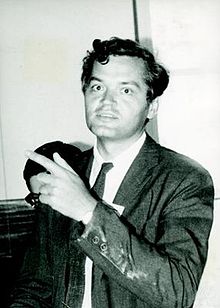James Glimm
| James G. Glimm | |
|---|---|
 |
|
| Born |
March 24, 1934 Peoria, Illinois |
| Residence | United States |
| Citizenship | United States |
| Fields | Mathematics |
| Institutions |
Institute of Advanced Study MIT The Rockefeller University New York University Stony Brook University |
| Alma mater | Columbia University |
| Doctoral advisor | Richard Kadison |
| Doctoral students | |
| Known for | Constructive quantum field theory |
| Notable awards |
Heineman Prize (1980) Leroy P. Steele Prize (1993) National Medal of Science (2002) |
James Gilbert Glimm (born 24 March 1934) is an American mathematician, former president of the American Mathematical Society, and distinguished professor at Stony Brook University. He has made many contributions in the areas of pure and applied mathematics.
James Glimm was born in Peoria, Illinois, United States on 24 March 1934. He received his BA in engineering from Columbia University in 1956. He continued on to graduate school at Columbia where he received his Ph.D. in mathematics in 1959; his advisor was Richard V. Kadison. Glimm had significant stints at New York University, and at Rockefeller University, before arriving at Stony Brook University in 1989.
He has been noted for contributions to C*-algebras, quantum field theory, partial differential equations, fluid dynamics, scientific computing, and the modeling of petroleum reservoirs. Together with Arthur Jaffe, he has founded a subject called constructive quantum field theory. His early work in the theory of operator algebras was seminal, and today the "Glimm algebras" that bear his name continue to play an important role in this area of research. More recently, the United States Department of Energy adopted Glimm’s front-track methodology for shock-wave calculations, e.g., simulating weapons performance.
...
Wikipedia
